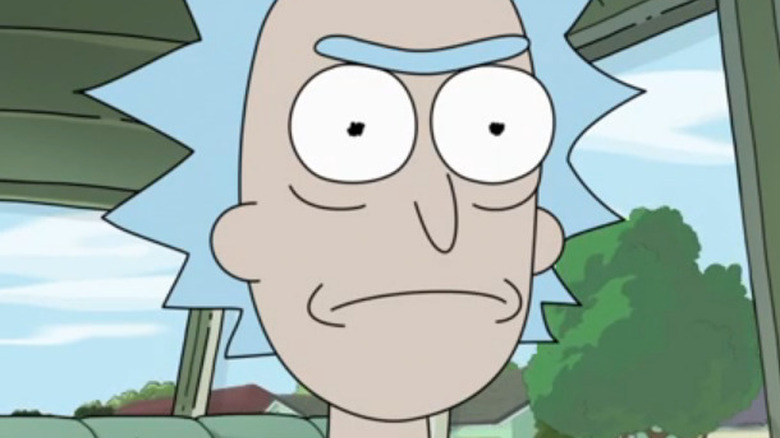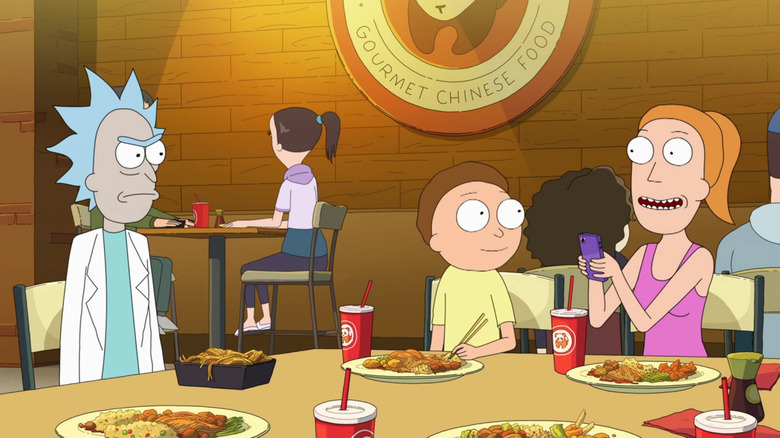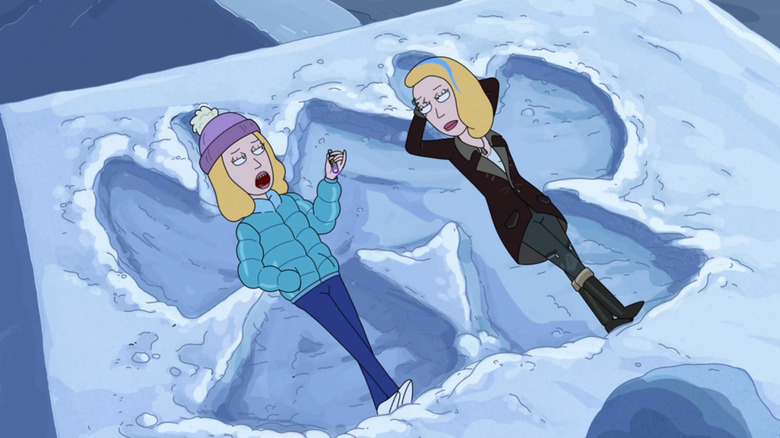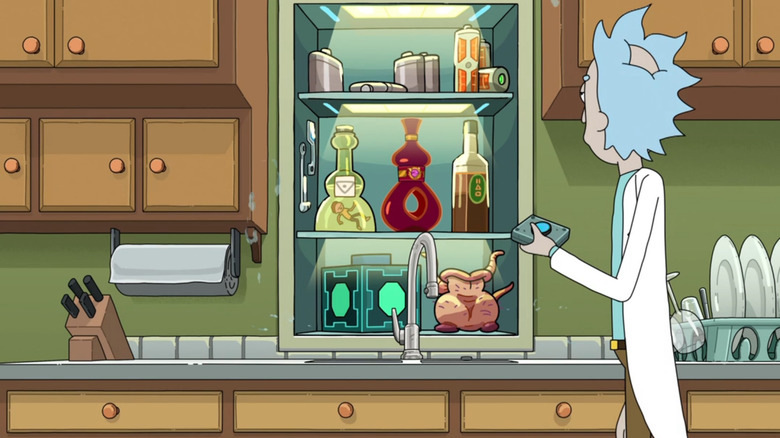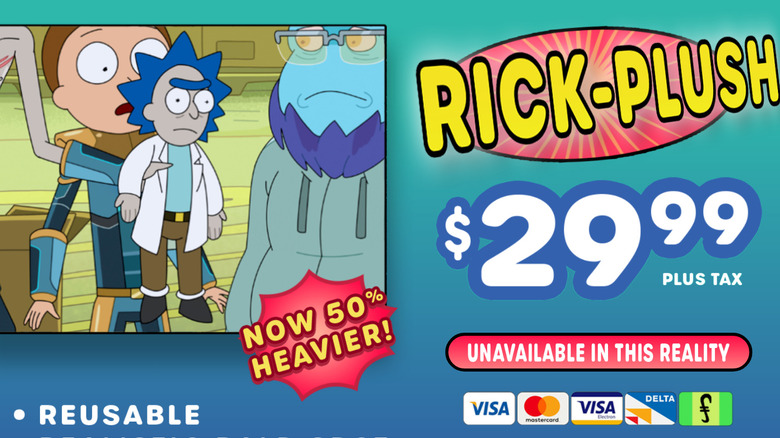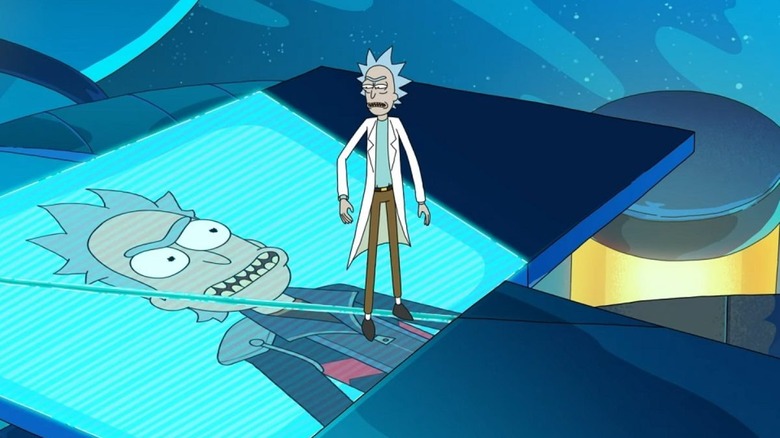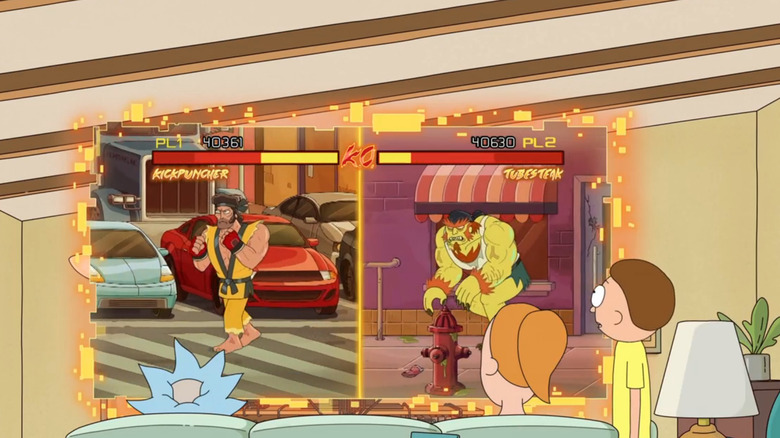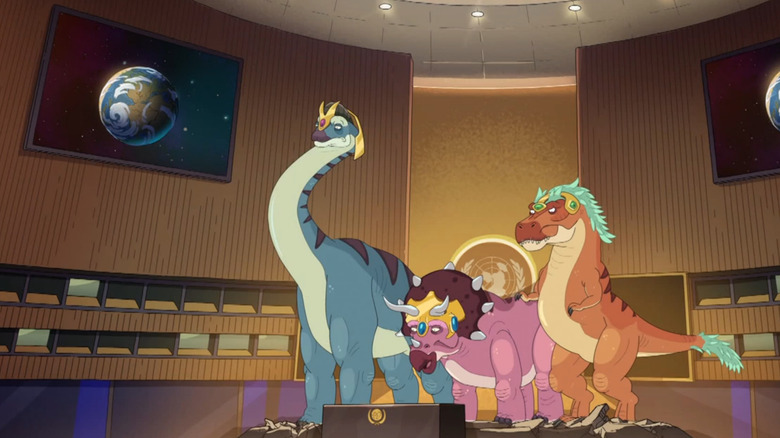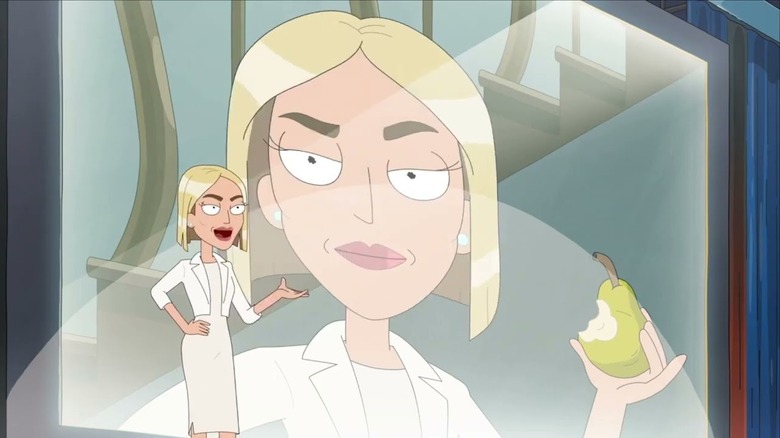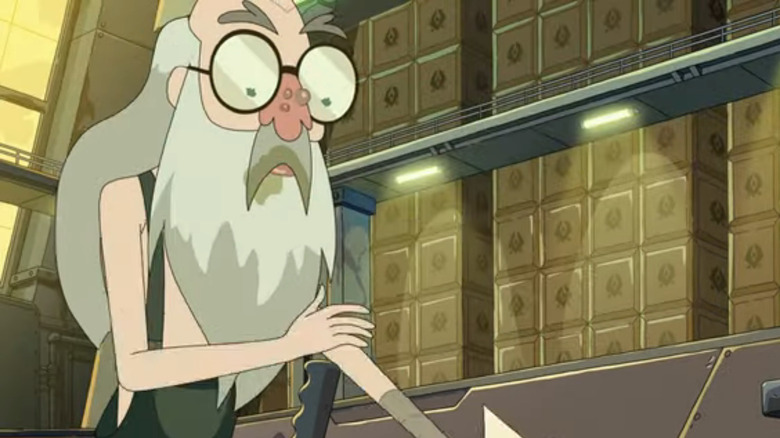Small Details You Missed In Rick And Morty Season 6
Adult Swim's "Rick and Morty" has officially wrapped its sixth season, and all those unique characters, meta jokes, and wildly veering trope-infused plots have created yet another top-notch round of episodes. Though ostensibly a sitcom, this season shows us that our central cast has actually grown quite a bit over the last several years. Granting Rick Sanchez emotional maturity may well be one of the most surprising achievements the show has accomplished to date, but he's far from the only one. This season, Beth falls in love with Space Beth, Morty and Summer choose not to react to some of the wilder goings-on in the house, and we even get a Christmas episode in which the family can safely express their love for each other after only a little chaos. Bravo, Smith family, and bravo, "Rick and Morty" Season 6.
One of the great delights of "Rick and Morty" is its dives into pop culture deep cuts, and so many of its fans aren't exactly easy to catch off guard with unnoticed details. After several seasons of dropping in obscure references to old films and now continuously featuring callbacks to its own continuity on the regular, this is a series that wears its obsessiveness right on its sleeve for all the world to see. Still, no matter how long you've been watching, chances are, there are going to be Easter eggs that even the most watchful eye will miss.
Pop culture references in the titles
Let's start out with a softball — the pop culture references in the episode titles. Naturally, longtime viewers will be more than acquainted with the series' tendency to fuse sci-fi references with the names of its central cast to create puns of nerdly splendor. Yet, while this season features some pretty easy to parse episode titles, like the dinosaur-themed "Juricksic Mort" and the meta masterpiece "Full Meta Jackrick," there are still a few surprisingly obscure nods along the way. Though the film "Solaris" is well known as one of the most influential sci-fi movies of all time, the title of the opening episode "Solaricks" is still an impressively offbeat nod.
The themes run wild from there. The scandalous self-love story between Beth and Space Beth of "Bethic Twinstinct" references the psychosexual thriller "Basic Instinct." When Jerry becomes perplexed by a fortune cookie that seems to foretell a fate worse than death in "Final DeSmithation," it's a nod to the horror franchise "Final Destination" in which attempting to prevent upcoming catastrophic events only makes them more likely to occur. The list goes on, but perhaps the best title of the lot is "A Rick in King Mortur's Mort," a play on "A Kid in King Arthur's Court," a mid-'90s kid-friendly time travel odyssey that paves the way for significantly more adult-oriented humor here.
The Venusian language is just French
Speaking of "Bethic Twinstinct" — what an episode it is. The seeds of Space Beth are dropped in "The ABCs of Beth" back in Season 3, but we don't meet her in her full action hero glory until "Star Mort: Rickturn of the Jerri." Since then, she's been a recurring character, popping in and out of the Smith family's lives between epic space missions. Here, we see her settling in for a friendly stay at the old homestead only for her and Beth to show a growing interest in spending time with one another. To the surprise of absolutely no one except for Jerry, Beth starts to fall for her other self as both Beths revel in how much they have in common. "I can't tell if I'm the healthiest or unhealthiest woman in the universe," says Beth.
Though her family would be very happy to go on not acknowledging any of this, a confrontation eventually occurs, and things somehow get even weirder from there. Still, we can definitely understand what Beth sees in Space Beth. Part of how Space Beth charms her is by complimenting her in Venusian, the cosmic love language. Yet, as some viewers will notice, it's actually just regular old Earth French, highlighting actor Sarah Chalke's multilingual abilities — she's also fluent in German.
Rick hid the Meeseeks box
There's another hidden reference in "Bethic Twinstinct" that eagle-eyed fans might have caught, but they'd have to be fast on the draw to notice it as it only appears for a couple of seconds toward the end of the episode. After being the only family member not particularly surprised or perturbed by the Beths' affair, Rick is still open about thinking it's an overall bad idea. Acknowledging that the affair between the two Beths occurs after they imbibe Venusian wine, he pops the bottle into a hidden display case behind the kitchen sink before destroying the remote in hopes of preventing any such mishaps in the future.
Yet, during a glimpse inside the cabinet, we see a Meeseeks box sitting casually on the bottom shelf of this particularly hazardous locked case. Introduced in the episode, "Meeseeks and Destroy," the adorable and cartoonish (and we mean "cartoonish" relative to the standards of the popular cartoon "Rick and Morty") Meeseeks exist only to complete a single task. Once their task is given, they complete their assignment and self-destruct immediately thereafter. These extremely strange creatures are more than a little terrifying, so it's both comforting that the box is behind glass and alarming that it's just kind of hanging out on a shelf in the Smith family kitchen.
Episode 7's fake websites are actually real websites
As an intentionally self-referential extravaganza, the episode "Full Meta JackRick" overflows with meta jokes and puns that ought to delight longtime sci-fi fans. That fact that it features a group of supervillains (or are they superheroes?) called the Self-Referential Six — that's Miss Lead, Protago Nick, Connie Tinuityerror, Flash Back, Mr. Twist, and Rhett Caan – should tell you all you need to know about what kind of themes this story delves into. The episode even features Rick and Morty going through the show's title sequence with Rick urging Morty to ignore the self-referential humor or be lost.
Two websites are casually mentioned in this episode in throwaway lines, which may lead viewers to believe that they are entirely fictional. They are, in fact, live websites; the meta www.story-train.com redirects to the Adult Swim website and www.rick-plush.biz links to a prompt to buy the comical "Rick-Plush," a toy touted as "now 50% heavier!" Though this looks like an awfully fun toy, it also turns out that it's an offer "limited to participating dimensions" and "unavailable in this reality." Oh, well.
The Rick Prime holograms are from other episodes
Seasons of "Ricky and Morty" tend to go out with a bang, and the conclusion of Rick's journey in Season 6 is no different. After viewers are lulled into a false sense of security, perhaps coming to believe that Rick has chosen to embrace life with the Smiths and reach out to his family more, "Ricktional Mortpoon's Rickmas Mortcation" tells us that he has truly spent the last few episodes of season continuing his search for his archnemesis Rick Prime. Morty realizes this when Rick gifts him a lightsaber but Morty accidentally drops it and it cuts through the Earth at an alarming speed. The lightsaber continues to nearly reach the Earth's core and destroy the planet, but that's not the important part...
Having replaced himself with a robot programmed to be 22% nicer in order to cover his tracks, Rick has actually been absent during key moments this season, leading Morty to question their relationship once more. The theme of Rick being replaced with static images to fool us continues in some surprising ways. For instance, this episode features holograms of Rick Prime, but eagle-eyed viewers will note that they're not actually new animations — some are lifted straight from "The Rickshank Rickdemption" and "Solaricks." While ostensibly a Christmas episode, this entry primarily deals with themes of negligence and betrayal as Rick's ongoing manipulation of Morty is uncovered yet again — just in time for the holidays.
The deep cut Community reference
Before "Rick and Morty," creator Dan Harmon was best known for heading up the sitcom "Community." Another series that delights in self-referential humor and Easter eggs, "Community" is where we're first introduced to the character Kickpuncher — the lead in an action movie franchise who regularly fights his nemesis Punchkicker. "Community" characters Troy and Abed are obsessed with the series, which inspires a number of jokes throughout the show.
In "Bethic Twinstinct," the main plot may be all about Beth, but much of Summer and Morty's time in the episode is spent playing an over-the-top video game called "GETTIN' TO A STREET FIGHT" that is a not-so-subtle reference to the "Street Fighter" franchise. Lo and behold, there on the screen is Kickpuncher looking to rumble. Though Summer initially attempts to dismiss Morty's interest in the game, she also plays, and the two note that the game has the surprisingly healthy benefit of helping them ignore some of the weirder stuff that happens in their lives — for instance, their mom hooking up with her own clone in the next room.
A dinosaur really did speak before the U.N. (kind of)
The series' second episode to feature a "Jurassic Park" reference in the title following the early Season 1 episode "Anatomy Park" overflows with spacefaring dinos. Rick drives Morty to school one morning only for Morty to be surprised to discover that the school is abuzz with the revelation that enormous spaceships have arrived with three sagely dinosaurs aboard. Having created expansive technology and left the Earth, the dinosaurs return to shock and dismay upon learning dinosaurs are extinct and humanity has inherited the Earth.
The three leaders of the dinosaurs include a Tyrannosaurus, a Brachiosaurus, and a Triceratops. The trio out of time speaks in front of the U.N., explaining what occurred and drop hints that they find humanity more or less ill-suited to control the planet. While we've got some concerns about that as well, this scene not only calls back to the classic "Twilight Zone" episode "To Serve Man" in which aliens appear and say much the same thing, it also recalls a recent real-life PSA. In 2021, a commercial featuring a particularly eloquent dinosaur voiced by Jack Black urges world leaders to choose a better path, lest they go the way of the dinosaurs due to climate change. No word from world leaders on that front as of yet, but this is another subtle reference to our modern world that some viewers may have missed.
Jennith Padrow-Chunt is Gwyneth Paltrow
The "Oedipus Rex"-inspired "Final DeSmithation" introduces us to a couple memorable new characters as Jerry begs Rick to help him prevent a terrifying future, and we can't help but notice these supposedly new faces feel pretty familiar. When Jerry and Rick uncover the factory that created a fortune cookie that horrifies Jerry, the meet the head of the corporation, Jennith Padrow-Chunt. Though it might be easy to dismiss her as simply being another beautiful and terrifying profit-driven monster, some clues indicate that her pseudoscience-based health and beauty empire might be based on a certain famous actor who despite her stellar performances in "Iron Man," "Avengers: Endgame," and multiple other films in the series, has no idea what's going on in the MCU.
Dropping nuggets of "wisdom" like, "Fate isn't fiction," and "Everything can be yours if you ask for it," Padrow-Chunt is a direct riff on Gwyneth Paltrow's health brand Goop. Spouting essentially meaningless thought-eliminating cliches and putting forward general xenophobia as a virtue, Padrow-Chunt talks as if she's constantly pitching copy for a Goop newsletter. Heavily criticized for allegedly relying on pseudoscience to influence the lives of people looking to create a healthier world for themselves, Goop is regularly under fire in the press. Though it's unlikely that there is a fortune-producing monster in her factories or that she'll undergo an "Akira" style transformation anytime soon, Paltrow is almost definitely a major inspiration for this character.
Old M. Hucksbee started COVID?
In "Final DeSmithation," Jerry becomes so stressed about the possibility of fulfilling the omen on a fortune cookie that he allows his entire life to be derailed, even changing how he dresses in hopes that the fates will be tricked into passing him by. This leads them to finding the company that manufactures the fortune cookies where they discover some pretty unpleasant details about the sweet morsels. Captured and stuck in the factory while awaiting a fate worse than death, Rick and Jerry are introduced to the chaotic, rambling Old M. Hucksbee, who is the keeper of the Lockerean, the creature that — ah, well, let's say the Lockerean "produces" the fortune cookies.
We immediately get the sense that Hucksbee is not quite all there, and he confides in Rick and Jerry that he dreams of escaping the factory with the Lockerean, which he seems to have fallen in love with. Hucksbee speaks in a rapid stream of consciousness so it isn't always easy to understand what he's saying, but at a certain point, we catch a threat that he intends to launch a virus on the populace that will shut down the whole world if Jerry and Rick refuse to help him. A virus with catastrophic effects certainly sounds familiar after the last few years, leading us to wonder ... did Old M. Hucksbee cause COVID? As he doesn't appear to survive the episode, we may never know for sure.
